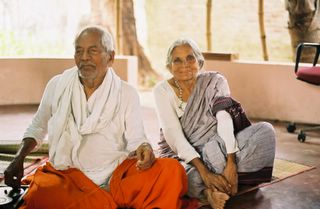Teach a man to fish
It is also profoundly wrongheaded. Before teaching a man to fish, you have to be pretty darn sure that there are fish in the river, that the river isn’t polluted, that the fish are fit for eating, that the breeding grounds for the fish are protected so that it is environmentally and economically sustainable, and that too many people aren’t fishing the same river, with the result that there is not enough for anyone. Without the necessary efforts to ensure the social and environmental conditions for fishing, what you have done by teaching the man to fish is ensure that the man will remain hungry for a lifetime, as will his children, and his children’s children. If you teach a man to fish under such conditions, you take away his self-respect, his drive to better his condition, and his will to teach his children that they can better themselves as well. And he will never trust you again. The man would be much better simply given the fish.
The Oriyans leave today. Bhoomikumar and I went out and bought blue and green towels (neck clothes) to present to each of them. A new all-India team, based out of Madhya Pradesh in the middle of the country, is replacing them. Yesterday, they went out to clean up another school, still filled with sand and muck three-and-a-half feet high, where they found an astonishing sight. On top of the muck, the villagers had placed a blanket, on top of which they placed all the clothing they had received from the international relief agencies. "We are fisherfolk," said a village elder, "We don’t wear trousers, or fancy clothes or all these things. So we are planning to resell them if we can." At the other end of the school, again on top of the sand and mud, were hundreds and hundreds of loaves of bread. They’d been there for days, and were already an unusually bright moldy green color. (Not likely to be resold.) We are certain that some relief agency, surely from outside the area, and likely from outside the country, thought they were doing "a good thing". Fisherfolk don’t eat bread. So on top of our usual burdens, the volunteers had to dispose of the moldy bread. (And in India, this is no small thing – it’s not like there is a municipal garbage pick-up. The goats might eat the bread, though they can be finicky too, and the non-biodegradable plastic bags in which the bread came will likely hang around the village for months or even years, a reminder of the good intentions of some international aid agency.) These people already know how to fish, but the environmental and social conditions under which they can get back to feeding themselves may never exist again without a radical reversal in social and environmental policy. The government thinks that repairing a few boats, and buying a few fishing nets will do it. The local fisherfolk will tell you otherwise. Meanwhile, temporary structures, with tin roofs, under which the people will bake in the hot sun, are being erected.
Over dinner, Krishnammal tells us a story from the time of her mother. It seems that, among all communities, even as late as the 1930s in her area, it was forbidden to sell any food stuff that was white. Milk, yoghurt, rice (millet being the usual staple) were all outside the market system. At one time, her family had four water buffaloes, and they provided so much milk, that after work and feeding the family, her mother would stand by the roadside giving it away. And these were very, very poor people.
Krishnnammal’s favorite saying from her spiritual forefather is that "Everything is possible."
We shall have to see.


2 Comments:
Thank you for blogging India's troubles after the Tsunami. Most of us over here *(USA) don't know the details of what is really needed. The latest we have heard from the Red Cross is "Do not send things. Money is needed, instead, because of the prohibitive cost of shipping." If the local relief is also uninformed as to the real needs, what are we to do?
Thanks for your comments. The government has done a generally good job in the big picture of relief right after the tsunami, and continue to work wonders getting municipal services back up. There is now even electricity in Nagapattinam. Many of the international relief agencies, though, who weren't in the area before the tsunami seemed to have no idea what they were doing, and seemed to have no interest in the people they actually claimed to be serving. (exceptions include World Vision, UNICEF, Doctors Without Borders, and the Italian, German, French, and Irish medical missions.)
Now that the photo-ops have lessened, the big agencies seem to have departed. I haven't seen "Save the Children", CARE, Hope International, or the International Red Cross in days, though they may be serving folks in outlying camps.
But the big thing is knowing, really knowing the people you are serving, and taking the time to really listen to their needs, rather than simply throwing material at them. And, it does seem pretty overwhelming at times.
Amma and Appa are already known by the people in this area (as you have read in the blogs). Especially by the poorest people. The total amount of funds we have raised from the U.S. probably doesn't top $15,000; and maybe there is triple that from Italy. But we have literally an "army" of people who know this area, can talk the language of the local folks, and know how to work the system.
The big work is just beginning. Please remember us in your thoughts, prayers, and contributions.
Post a Comment
<< Home